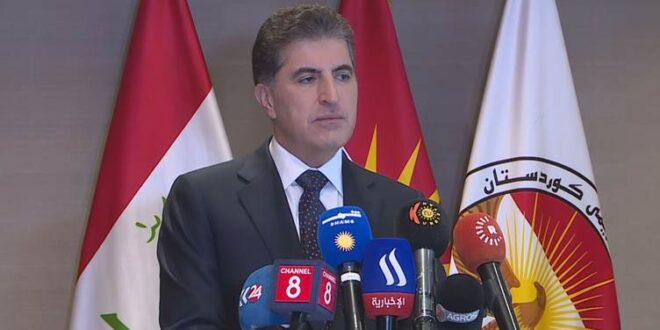Kurdistan Region President Nechirvan Barzani on Sunday expressed the need to maintain foreign troops in Iraq, Syria amid the evolving events in the region and the potential resurgence of the Islamic State (ISIS).
Speaking to reporters at the conclusion of the Munich Security Conference (MSC), Barzani stated that Erbil “views ISIS as an existential threat to Iraq, the Kurdistan Region, and Syria,” adding, “We believe that Iraq requires [the support of] international forces,” given the ongoing challenges.
Barzani added that he reiterated to the United States Secretary of State Marco Rubio on Saturday that “there is a need to provide support [to maintain] the stability of Iraq.”
Despite its territorial defeat in 2017, dormant ISIS cells and remnants continue to pose a security threat to Iraq and the Kurdistan Region, particularly in disputed territories spanning several provinces including Diyala, Kirkuk, Nineveh, and Salahaddin.
On Syria, the Kurdistan Region’s president revealed that Erbil advised Kurds in Syria to “go to Damascus united,” adding that they “should lead a dynamic approach and not wait for Damascus to call.” He further emphasized the importance of resolving outstanding issues among counterparts in Syria “through dialogue and understanding” and working together with all of Syria’s constituents to achieve a “stable future for all.”
Barzani further wished for “stability for Syria” and “a better life for the Syrian people.” He also hoped the new leadership in Damascus – led by interim President Ahmed al-Sharaa, “can be a catalyst of stability” for the country.
Of note, Barzani on Saturday met with the new Syrian Foreign Minister Asaad al-Shaibani in Munich, amid concerns that Kurds are being excluded from discussions about Syria’s future. He asserted the Kurdistan Region’s readiness to contribute to “stability in Syria.”
Barzani also touched on the anticipated message from the leader of the Kurdistan Workers’ Party (PKK), who is jailed in Turkey. “We expect it to be a message of peace and stability for Turkey, and largely directed to the PKK,” Barzani said.
Responding to a question by Rudaw’s Alla Shally on the peace efforts between Turkey and the PKK, Barzani expressed gratitude to Ankara for its “very serious” approach to peace, stressing that thorny issues between the two sides “will not be resolved through conflict, weapons, and violence,” but rather “politically and through peace.”
It is worth noting that a delegation from Turkey’s pro-Kurdish Peoples’ Equality and Democracy Party (DEM Party) arrived in the Kurdistan Region on Saturday to meet with the Kurdistan Region’s top officials and representatives of the ruling parties.
The group met Kurdistan Democratic Party (KDP) leader Masoud Barzani on Sunday and are expected to meet President Barzani on Monday. While the details of the talks remain unclear, DEM Party officials have stated that “the aim is peace.”
Regarding the formation of the Kurdistan Regional Government’s (KRG) tenth cabinet, Barzani asserted that the two ruling parties – the KDP and the Patriotic Union of Kurdistan (PUK) – are engaging “in serious talks” and that “progress would be achieved in the near future.” Once headway is made, the two parties “can start discussing cabinet posts,” Barzani explained.
The Kurdistan Region held its delayed parliamentary elections on October 20, with the KDP securing 39 spots in the 100-seat legislature, followed by the PUK with 23 seats. Given that no single party won a majority, a governing coalition must be formed, as is customary in the Region.
Barzani also addressed relations between Erbil and Baghdad, stating that relations between the two “are much better now than before.” He praised the incumbent Iraqi Prime Minister, Mohammed Shia’ al-Sudani, for “exerting his best efforts” to resolve outstanding issues with the Kurdistan Region.
The Kurdistan Region’s president additionally expressed happiness with the improvements made in Iraq, including advancements in security, stability, and development, noting that “the people of Iraq deserve a better and more pleasant life.”
President Barzani led a delegation to Munich on Thursday to participate in the MSC and hold discussions with global leaders on regional security, joint cooperation with the Kurdistan Region, and the situation in Syria, including the Kurdish population.
The MSC is an annual event that brings together world leaders, academics, and civil society figures to discuss global security issues.
 Eurasia Press & News
Eurasia Press & News




